Table of Contents
Guitar strings and how often you should change them
Whether you know it or not, if you play your guitar often, you should change your strings regularly.
In addition to losing their liveliness and tone, guitar strings can also fall out of tune, cause intonation problems, and even break over time because of that, it is important to know how often to change guitar strings.
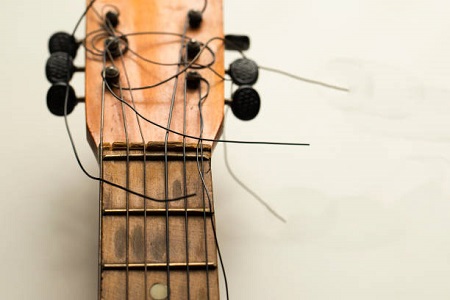
It is true that guitar strings break. There is no need to worry if they happen because that doesn’t mean you have a damaged guitar. Breaking a string is perfectly normal. This is why learning how to replace strings is a smart idea.
The purpose of this guide is to explain how often you should change your guitar strings and answer a few other questions related to them.
How often should I change my guitar strings? Here’s the short version!
Beginners shouldn’t worry about changing their strings more than once every three to six months unless they have a regular practice routine.
Once every four to eight weeks should be enough for an intermediate guitarist with a routine and some minor commitments.
It’s recommended that advanced guitarists change their strings every two to four weeks.
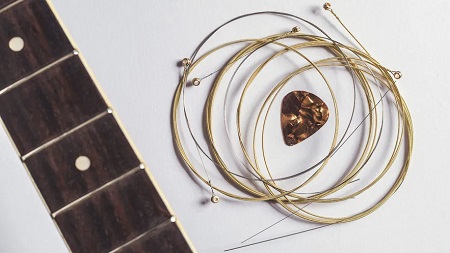
Professional guitarists – who probably don’t need much advice – should change their strings at least once a week. There are a lot of pros who change their strings before every gig. This is more intensive but can definitely put you at ease since newly added strings are less likely to break.
Guitar strings, how often should I change them? Here is the longer version!
How often you play your guitar is the biggest factor here. Playing more will wear out your guitar strings faster. Therefore, you’ll probably have to replace them more often.
It’s no secret that strings get abused a lot. When tuned up, they’re not just under significant tension. In addition, they are put under additional pressure by various techniques, such as string bending.

Our experience has shown that some strings last longer than others, but if you play a lot, you may need to change your strings more often.
In general, if you spend several hours per day on your instrument, whether you’re practicing, jamming, recording, or performing, it would be a wise idea to change your strings every two to four weeks.
When you’re a beginner, and you don’t play very often, maybe once every three months is fine. Depending on the situation, you might be able to get away with six or twelve months. Those strings aren’t going to last long if you end up picking up momentum with your practice routine afterward.
Changing your strings more frequently is a smart idea if you are a professional gigging musician or you gig several times per week. Strings are usually changed once a week by these guitarists, and sometimes even before shows.
Performing on stage is no place for breaking a string. The experience of breaking a string mid-song isn’t pleasant even if you have a backup guitar. The sound of brand-new strings is also preferred by some gigging or professional guitarists.
The tone is another factor to consider. Strings lose their liveliness more quickly if they are exposed to the elements (grime, dirt, oil, etc.) often.
While most guitarists would replace their strings once they lose their twang, some guitarists like Eddie Van Halen reportedly kept old strings on his guitar since they had a “warmer” sound. Because he used old strings on stage, he often broke strings during performances. He liked their sound – it did not matter to him.
To be honest, we usually replace strings on some of our instruments (like the ukulele) when they break or if we have an important gig coming up. Additionally, if someone is appearing at a string of important events, they will need to change strings frequently.
Wear and tear is a normal part of life. However, things like weather, humidity, sand, and dirt can affect your strings and fretboard depending on where you live.
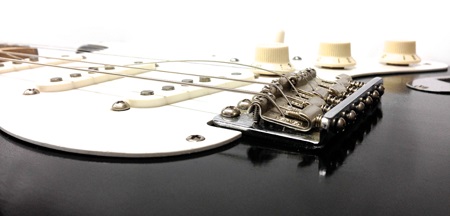
There is no definitive answer to this question. If your strings are showing signs of wear (corrosion, loss of pitch, breakage, tuning issues, etc.) then it may be worthwhile to consider swapping them out every two to four weeks. A two-month interval might be sufficient.
Then there is the matter of tuning. Aging can have an effect on the tuning and even the stability of the intonation of strings. There are some guitarists who can work with this and may even compensate for the small difference.
In addition, if you are just practicing, you might not find it too bothersome. However, keeping old guitar strings on your guitar may not be a wise idea if you’re planning to perform or record.
Replacing your strings when yours lose their stability is certainly an option. The best way to prevent this is to swap out your strings every two to four months.
As a result, there isn’t one answer that fits all. In addition to how much you play, how your guitar sounds and functions will influence how often you change your strings. Additionally, the gauge, coating, brand, and model of the strings can all have an impact on their longevity.
What can you do to make your strings last longer?
It’s understandable that you might not want to change your guitar strings constantly. That leads you to wonder, “What if my strings could last longer?” It turns out that… There isn’t much you can do. A few habits, however, can make a big difference, so let’s discuss them.
The first thing you should do is wash your hands before using anything. Throughout the day, your hands tend to accumulate dirt, grime, and oils, reducing the longevity of your strings. Before playing guitar, make sure your hands are clean.
Additionally, you can wipe down your strings after each use. You will need to do this if you want your strings to last longer. Even though it won’t make much of a difference, it can be helpful nonetheless.
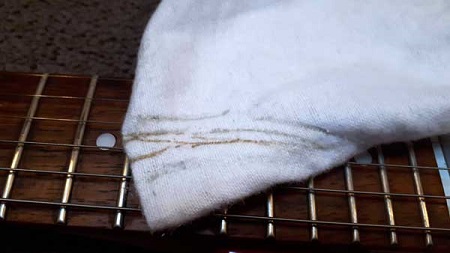
The effectiveness of wiping down your strings can also be improved by using a string cleaner.
The third option is to store your guitar in a case. The process of taking your guitar into and out of a case is tedious, but you can extend the life of your strings by doing so.
Lastly, some players insist boiling their strings (in water, for about 15 minutes) rejuvenates them. Our opinion is that taking off your strings, boiling them, and putting them back on your guitar seems like a waste of time and energy.
The choice of strings is often overlooked by players, who stick to whatever their heroes use or what they recommend. After experimenting with a variety of strings, I’ve always favored those that last longer (namely, Fender Super Bullets). There is a difference.
Also, coated strings (such as Elixirs) can be used on guitars. We don’t think they’re a lot longer lasting than regular strings, even though they can cost quite a bit more. Experimenting is always a smart idea.
How do you know if it’s a perfect time to change your strings?
Eventually, guitarists develop a good intuitive sense of everything – when to solo, which riffs to play on specific songs, what their bandmates are thinking, etc.
The same can be said for developing an intuitive sense of when it is time to change your strings. As a result, it depends on many factors that we have already discussed.
- Are you a guitarist who plays for several hours per day? Is it just 15 minutes here and there?
- Do you have a lot of gigging experience? Are you just jamming with your friends?
- Are you concerned about how the strings sound, or do you not mind playing with dead strings?
- Is it okay for you to have some tuning issues with your guitar, or would you prefer it to be more reliably in tune?
Right and wrong don’t exist. You should only use what works for you based on your habits. However, you can certainly pay attention to the following signs:
- Have your strings started to lose their luster? Do they corrode? Perhaps it’s time to replace them.
- Is the tone and liveliness of your strings fading? Strings that are broken in may sound “warm” to some guitarists, but otherwise, it is time to replace them.
- Are you having trouble keeping your strings in tune? You might be able to fix the problem by changing the strings on your guitar.
- Have you broken a string? The whole set might need to be replaced.
Is it possible to replace one string at a time?
There’s one string that’s broken. Is it possible to just replace one string and leave the rest the same? You can use this if you’re just practicing or jamming.
Here’s the longer answer. As a result of one string breaking, it is quite possible that the rest will follow. This does not mean they are broken, or that they will necessarily break tomorrow. However, when one string breaks, it signifies that the whole set is about to fall apart.
In the end, all the strings on your guitar have been used a bit. You’ve likely played the other strings about the same amount as the other strings since they’ve been under tension for a while.
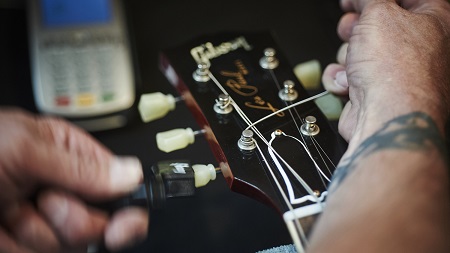
When the guitar is only used for practice, replacing one string at a time is not a bad strategy. Nevertheless, you should always prepare well before performing or recording, which may mean replacing the entire set.
Is changing strings a matter of preference?
Yes, in many ways. It’s all about preference. If we don’t have an important engagement coming up, we tend to play the strings until they break. Then we are getting on a new set.
Make sure there’s no friction between professional engagements since that could hurt your career. Eddie Van Halen is another example as we mentioned earlier. He preferred the sound of old strings, despite being a bit of an outlier. Others may prefer the sound of fresh strings over anything older than two weeks on their guitar.
Swapping your strings regularly is a good habit to get into when you’re starting out. Playing anywhere, anytime is an effective practice. After you’ve mastered playing the guitar and changing strings, the rest is up to you. You decide when you want to change them. Whatever works for you, go for it.
In this video, you can see interesting suggestions on when and how to change your guitar strings:
How often to change Guitar strings – Final Thoughts
Don’t forget to keep plenty of replacement strings on hand. It’s never a bad idea to have them around, especially if you play guitar a lot.
Make sure you have extra strings when you’re performing or recording. A lack of strings could ruin a professional engagement, and you don’t want that to happen.
As you play, you’ll learn how often you need to change your strings. Enjoy the journey and don’t worry about it. Lastly, focus on playing guitar, not changing strings all the time.
Happy Strumming!







